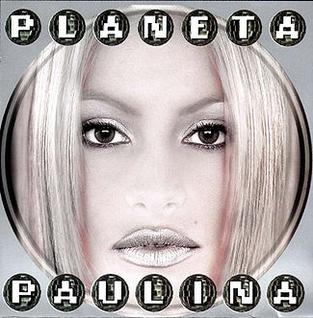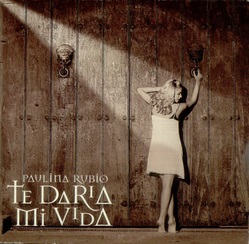
Paulina Susana Rubio Dosamantes is a Mexican singer, songwriter and television personality. Referred to as "The Golden Girl" and "Queen of Latin Pop", she first achieved recognition as a member of the successful pop group Timbiriche from 1982 through 1991. After leaving Timbiriche, she embarked on a solo career. Rubio has sold over 15 million records, making her one of the best-selling Latin music artists of all time.

Planeta Paulina is the fourth studio album by Mexican singer Paulina Rubio. It was first released by EMI Mexico on 22 August 1996 in Mexico and 3 September in United States, and distributed in 22 countries around the world months later. The singer asserted partial creative control over the project, taking the role of co-producer and composer of the material assisted by various musicians and producers, namely K.C. Porter, Rodolfo Castillo, Cesar Lemos, Cesar Valle, Per Magnusson and David Kreuger.

El Tiempo es Oro is the third studio album by Mexican pop singer Paulina Rubio, released simultaneously on 21 March 1995 by EMI Mexico in 18 countries. It was recorded in the autumn and winter of 1994 in Madrid, Spain, and Miami, Florida. Similar to her previous studio albums, Miguel Blasco was the primary producer but featured new producers and collaborations including Marco Flores, Adrián Posse and Claudio Bermúdez. At the age of twenty-three at the time, Rubio started to become creative and more involved in the process of creating and arranging the project compared to her two previous efforts, resulting in the album directing her to a new path in her music career, with a bolder image and a more dance-influenced sound, a reflection of her lead single. El Tiempo Es Oro deals with many subjects about love including relationships, passion, crushes, cheating, disappointment, and happiness.

Mexican singer-songwriter Paulina Rubio has released eleven studio albums, fifteen compilation albums, 62 singles, ten promotional singles, and has made some eleven guest appearances. In 1992, Rubio signed a recording contract with record label Capitol Latin in order to launch her career as a solo artist, after recording ten albums with Timbiriche between 1982 and 1990.

"Te Quise Tanto" is a song written by Coti Sorokin, Andahí and A. Schinoff and produced by Emilio Estefan Jr. and recorded by Mexican pop singer Paulina Rubio, and was included on her studio album Pau-Latina (2004).

"The One You Love" is a song by Paulina Rubio from her sixth album, Border Girl (2002). It was released as the album's second single in North America and Latin America. The song was written by Brett James and Troy Verges, and produced by Sheppard Goodman and Kenny Gioia. A Spanish version titled "Todo Mi Amor" was also included in the album and was released simultaneously with "The One You Love" to Latin America. That version reached the top five of the songs most listened to on the radio in Mexico.

Top Hits is the first greatest hits album by Mexican singer Paulina Rubio. It was released on July 18, 2000, through EMI Latin in United States. The album was released in two different editions, standard and limited, with the latter containing two remixes incorporates elements of Rubio's earlier singles. The album includes a new track: "Será Entre Tú Y Yo", which was previously released on the 1996 Olympics album Voces Unidas.

"El Último Adiós" is a song recorded by Mexican singer Paulina Rubio for her fifth studio album Paulina (2000). It was released as the second single from the album on July 17, 2000 by Universal Latino. Rubio co-wrote and co-produced the track with Estéfano, and was originally conceived it as a ranchera-hip-hop-styled song. Lyrically, its a break-up mood.

"Lo Haré Por Ti" is a song recorded by Mexican singer Paulina Rubio for her fifth studio album Paulina (2000). Written by Estefano and produced by Chris Rodriguez, the bolero-influenced pop rock song was then released as the lead single from Paulina on January 11, 2000, through Universal Music Latin, Polydor Records and Muxxic Records. The song marks Rubio's "comeback" single after the dissolution of her contract with EMI in the late 1990s. Lyrically, the song is about a woman who is willing to do anything for the man she loves, with refers to the tangos of the French Argentine artist Carlos Gardel.

"Mío" (English: "Mine") is a song recorded by Mexican singer Paulina Rubio for her debut solo studio album La Chica Dorada (1992). It was written by José Ramón Flórez and Cesar Valle and produced by Miguel Blasco and J.R. Florez. After recording and sending a demo tape, Rubio signed a multi-album deal with EMI Capitol de México in June 1992. "Mío" is a dance-pop song that refers to a girl's passionate feelings.

"Te Daría Mi Vida" is a song by Mexican singer Paulina Rubio, taken from her third studio album El Tiempo Es Oro (1995), written by C. Sánchez and C. Valle and produced by Miguel Blasco. The song was released as the album's lead single on 17 January 1995 by EMI Music. "Te Daría Mi Vida" is a dance-pop song and allegedly sold more than 140,000 copies in Mexico and the United States. The accompanying music video for the single was directed by Carlos Marcovich and was filmed in Xochimilco and the Estudios Churubusco in Mexico.

"Solo Por Ti" is a song written by Marco Flores for Paulina Rubio's fourth album Planeta Paulina released in 1996. It was produced by Marco Flores and released as the album's single in Mexico. The song peaked at #6 in the El Siglo de Torreón's Ballads Charts, the chart covers radios from Mexico City only.

"Dame" is a song written by Alejandro Lerner and Kiko Cibrian and performed by Mexican recording artist Luis Miguel. It was released as the lead single from his eleventh studio album Nada Es Igual... on 15 July 1996 to radio stations. "Dame" was recorded at the Record Plant studio in Los Angeles, California. The song incorporates R&B and hip-hop influences. The music video for "Dame" was directed by Marcus Nispel and filmed at the Mojave Desert in California and was nominated Video of the Year. It received mixed reactions from music critics who felt that the track sounded too similar to his previous pop recordings. "Dame" peaked at number two and one on the Billboard Hot Latin Songs and Latin Pop Songs charts in the United States and received a BMI Latin Award in 1998.

"Él Me Engañó" is a song performed by Mexican singer Paulina Rubio, recorded for her second studio album 24 Kilates (1993). The song was written by César Valle and Don Matamoros, and was released on February 3, 1994 as the second single off the album by EMI Latin. The song has been sporadically mentioned by the media as one of the singer's most acclaimed female anthems.
"Hoy Te Dejé De Amar" is a song recorded by Mexican singer Paulina Rubio for her third studio album El Tiempo Es Oro (1995). Written by Marco Flores and produced by Miguel Blasco was released as the album's third single on June 1995.
"Bésame En La Boca" is a Latin pop song with influences bolero written and produced by Adrian Posse and Didi Gutman. It was released by Mexican singer Paulina Rubio as the final single from her third studio album, El Tiempo Es Oro (1995). It was released in June 1995 in Mexico and in September in the rest of Latin America. Rubio's cover was also included on the soundtrack of the film of the same name, which she also starred in. The song did not have commercial success like their other singles and the airplay promotion was overshadowed with the promotional song of the Mexican telenovela Pobre Niña Rica.

Maxisingle is the first extended play (EP) by Mexican recording artist Paulina Rubio, released on October, 1995, in Mexico and United States by EMI Mexico. A digitally edition was released on January, 2005. It contains seven tracks: "Pobre Niña Rica", main song by the Mexican telenovela of the same name, three remixes of "Te Daría Mi Vida", and others three remixes of "Nada De Ti", both songs previously released on Rubio's third studio album, El Tiempo Es Oro.
"Pobre Niña Rica" is a latin pop song released by singer Paulina Rubio as the theme song from her Mexican telenovela of the same name, and later it was released in the first EP of the singer, MaxiSingle and in 1996 as a bonus track of her fourth studio album, Planeta Paulina. There are two versions of the song, the first was launched in conjunction with the launch of the telenovela in Mexico and is written by Graciella Carballo, Mario Púparo and the second was launched in early 1996 as a single airplay and is written and produced by Marco Flores.

Mexican entertainer Paulina Rubio has released four video albums and has appeared in fifty music videos and three guest appearances. From her debut studio album La Chica Dorada (1992), she released music videos for the singles "Mío" and "Amor De Mujer", all directed by Ángel Flores and released from 1992–93. For the first of these, she earned an nomination ERES Award for Best Video. She followed with three other music videos from her second album 24 Kilates (1993), "Nieva, Nieva", "Él Me Engañó" and "Asunto De Dos", directed by Ángel Flores, Daniel Gruener and Tito Lara, respectively Rubio's third studio album El Tiempo Es Oro (1995) spawned the singles "Te Daría Mi Vida" and "Nada De Ti", whose music videos was directed by Carlos Marcovich. This was followed by Planeta Paulina's videos: "Siempre Tuya Desde La Raíz", a futuristic video with a concept cosmic and 70's dance, "Solo Por Ti", recorded in a barren desert of Mexico and "Enamorada", which tells the story of gay couple. The three videos was directed by Tito Lara from 1992-1997.
"Enamorada" is a song by the Mexican recording artist Paulina Rubio from her fourth studio album, Planeta Paulina (1996). The song was released on January 4, 1997, as the final single from the album, and her final one for the EMI Music label. "Enamorada" was written by Rubio with Cesar Valle and produced by Rubio and Marco Flores. Backed by synthesisers and keyboards, it is a dance-pop track. The lyrics revolve around a love deception, involving a homosexual man.
















